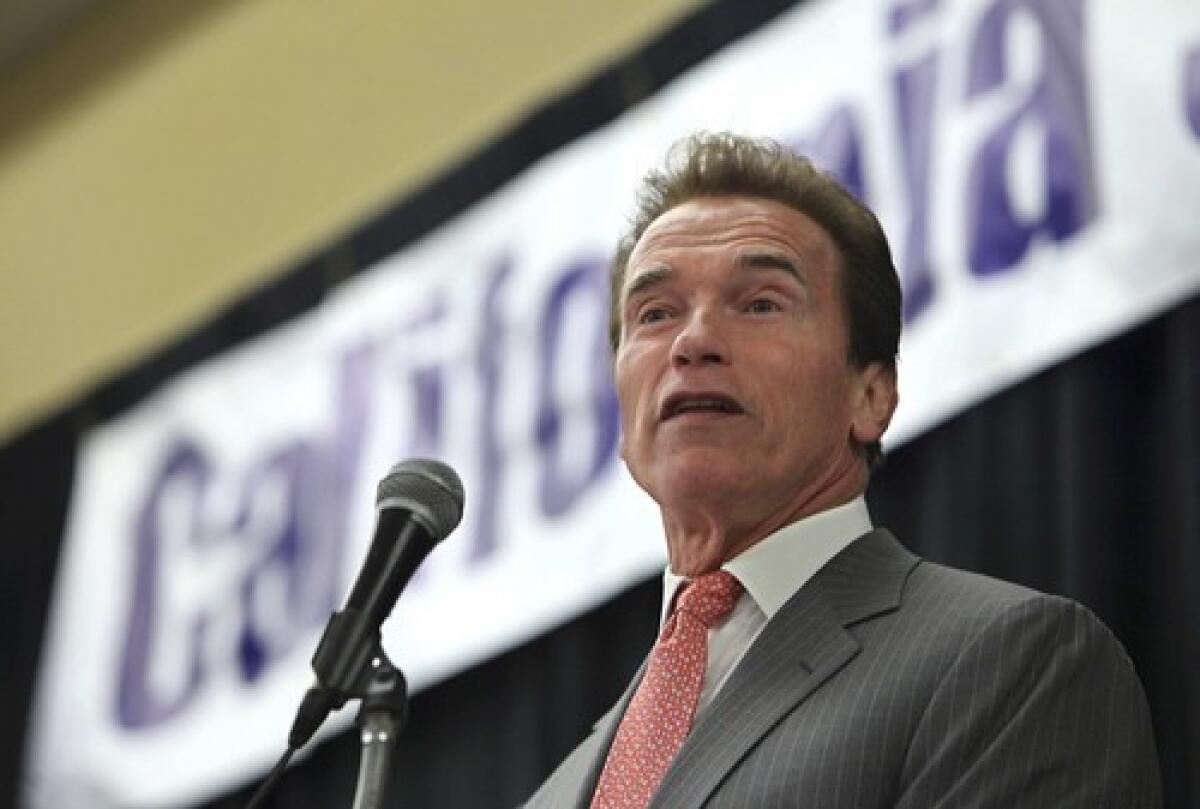Schwarzenegger sends lawmakers $5 billion in proposed cuts

Gov. Arnold Schwarzenegger on Tuesday sent lawmakers his plan to trim more than $5 billion in spending by dismantling or drastically curtailing state programs that provide Californians with healthcare, higher education, welfare, parks, AIDS treatment and counseling, prisoner rehabilitation and other services.
The cuts came atop other severe spending reductions in a separate $16-billion plan that the governor unveiled two weeks ago. His aides said he would propose another $3 billion in cuts by the end of the week to address a projected $24.3-billion budget shortfall.
Opponents of the proposed reductions mobilized throughout the day around the Capitol, which sprang to life again after a long holiday weekend.
Union members began a 48-hour vigil in the park that surrounds the statehouse, saying that their members would be driven into poverty, and the elderly and disabled deprived of care if Schwarzenegger’s proposals are adopted. They also filed a lawsuit in federal court that attempts to stop some of the planned cuts.
Los Angeles Mayor Antonio Villaraigosa came to the capital along with other officials to denounce Schwarzenegger’s bid to borrow $2 billion from local governments. The League of California Cities launched a website, “Save Your City,” asking for videos that will show how a state “raid” of local property taxes would affect people throughout the state. “Your city is in trouble,” the site flashed.
Meanwhile, lawmakers inside the Capitol debated Schwarzenegger’s plans in the gravest of tones.
“It shocks the conscience that we have to throw sick children off of welfare to satisfy Wall Street,” said Assemblywoman Noreen Evans (D-Santa Rosa), the budget committee chairwoman. She added: “This used to be the Golden State, and now it is a sorry state and it is not my California.”
Others, including Assemblyman Roger Niello (R-Fair Oaks), said the state must face the situation as it is. “We are being driven by an economy that has absolutely collapsed,” said Niello, the committee’s vice chairman. “This is nobody’s vision of where we wanted to be.”
The governor, who has said that voters demanded the reductions by rejecting a slate of ballot measures last week that would have raised $5.8 billion to fill the budget gap, taped an appearance Tuesday on “The Tonight Show With Jay Leno” for the departing host. Earlier, he had told a group of small-business leaders in Sacramento that the state would “face catastrophic consequences” -- the government could become insolvent -- unless he and lawmakers dramatically scaled back state programs.
“Behind every one of those dollars that we cut there are real faces,” the governor said. “I know that that could mean potentially that now Alzheimer’s patients will not get this in-home service that they deserve. . . . But you know something? Even though those are tough choices, what is the alternative?”
The governor’s plan would take $201 million from Californians seeking higher education by eliminating new cash grants and increased awards in the CalGrant program, and it would slice $750 million more from state college and university budgets.
Ana J. Matosantos, chief deputy budget director for the Department of Finance, told lawmakers that the governor’s plans to do away with state support for parks would mean that up to 80% of them would have to close unless there are fee increases.
The state could save $34 million by ending, among other services, treatment for breast and cervical cancer for illegal immigrants and women older than 65. AIDS patients would pay for more of their medicine, and the state would scale back testing and counseling for HIV, saving $55 million.
Matosantos said that by eliminating the CalWorks welfare program and the Healthy Families program for children’s healthcare -- which would affect 930,000 children -- the state could save nearly $1.6 billion. But it would also lose $4.7 billion in federal funds.
Schwarzenegger, who pushed four years ago to add the word “Rehabilitation” to the name of the Department of Corrections and Rehabilitation, would save $909 million by eliminating prisoners’ substance-abuse counseling, vocational training and educational programs, and commuting the sentences of nonviolent offenders a year early.
Villaraigosa, along with the mayors of Santa Ana, San Diego and Sacramento, said he was skeptical that if state officials raided their coffers, money would be available to repay them -- with interest -- within three years, as the state Constitution requires. In Los Angeles, the amount of money the state wants to borrow would pay the equivalent of 1,200 city workers, the mayor said. It would force cuts in police and fire services, the mayors said.
“We’ve had to cut services, we’ve laid off employees, we are doing what people are asking,” said Villaraigosa, who also met with the governor during his visit. “We’re being good stewards of what we have. We need the state to do the same. . . . We are not asking the governor and lawmakers to do anything we have not already done.”
Outside the Capitol, activists from the Service Employees International Union began their vigil to protest the governor’s proposal to further reduce, to $8 an hour, salaries for workers caring for the elderly and disabled in their homes. The effect would be less care and the loss of federal matching funds, the protesters said.
“We’re all trying to adjust to the recession, but cutting funds should not be the alternative at the expense of senior citizens’ lives and other disadvantaged people,” said Ellen Rollins, a home care worker from Santa Clara County.
The union sued the governor in U.S. District Court to block the wage cuts, saying that they would violate various provisions of federal law by discriminating against the elderly and disabled.
Aaron McLear, a spokesman for the governor, said the suit illustrates “how difficult it is to balance the budget when interest groups are willing to sue us to protect their piece of the status quo.”
On his 25th appearance with Leno (most of them pre-dating his political career), Schwarzenegger discussed the budget. But the conversation was mostly light -- they called each other “idiot” a few times -- and the governor gave the comedian a proclamation thanking him for producing his show in the state.
“Will this get me out of a ticket if I put this in the back window?” Leno asked.
“People do it,” Schwarzenegger said.
michael.rothfeld
@latimes.com
patrick.mcgreevy
@latimes.com
Evan Halper and Liberty Matias contributed to this report.
More to Read
Start your day right
Sign up for Essential California for news, features and recommendations from the L.A. Times and beyond in your inbox six days a week.
You may occasionally receive promotional content from the Los Angeles Times.







